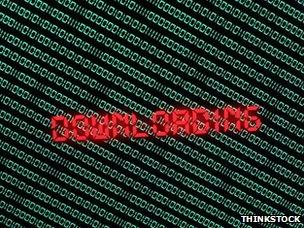Music piracy - who’s on the moral high ground?
- Published
- comments
Google says it already removes two million links a month on requests from rights holders.
It's a battle between one of the world's most powerful companies, Google, and the trade body representing British music labels, the BPI. The increasingly bitter confrontation over what responsibility the search firm has to help in the battle against web piracy is the subject of my film for Newsnight on Wednesday evening.
The BPI says Google has become a directory for piracy - put Adele or any artist plus MP3 into the search box, and you'll find page after page of unauthorised sites before you come to anything legitimate. The trade body wants the pirate sites pushed down the search rankings - Google says it already removes two million links a month on requests from rights holders, and it can't mess with its search algorithm.
I suspect that many of you reading this will come down on Google's side. After all the music industry is hugely powerful, and has been ripping off consumers for years, right? Who are they to take the moral high ground?
But don't forget that Google now earns about three times as much in the UK as the entire music industry. And if you think the call for action against the firm comes exclusively from bloated record industry executives who deserve no sympathy, listen to Alastair Nicholson.
He has been running the UK hip-hop label Son Records for more than a decade, battling to keep afloat. Visit his office, and you'll find no flunkies delivering flowers or a boardroom decorated with rock memorabilia - just one man in an attic flat.
Son Records has been a labour of love for Alastair, who believed UK hip-hop artists were more political and less crassly commercial than their American equivalents - and wanted to get them a wider hearing. He had modest success at first, but gradually found that sales were falling away. "When I looked online I'd just find a lot of my stuff myself lying around for free and it seemed to me to be getting a worse and worse problem."
So with one album, Genghis by Cappo and Stylee C, he tried a new approach to try to beat the pirates. First, he released a special edition of the album on vinyl, without handing out any digital copies to reviewers. They complained, but the vinyl version sold well - and when Nicholson searched the web he found no trace of any unauthorised copies.

The vinyl edition covered some of the costs, but the album was never going to be profitable without a full release. Alastair prepared to release Genghis on a wide range of formats - CD, digital download, even a special edition USB stick. The day after the release he went to his computer:
"Every day up to the release it had been clean - links to our websites, reviews, and so on. The day after the release when it had become simultaneously available on all the download sites I was just horrified. I did a search for the artist name and the album titles and it was just page after page of file shares and free downloads and I didn't get to anything legitimate until the bottom of the fifth or sixth page."
He spent the next 10 days trying to hunt down every pirated link, contacting Google and issuing takedown notices. Eventually the search results began to look better, but the damage had been done. "In my opinion it pretty much killed it," he says. "Having had this month long period when I was selling a lot of copies of records - the limited edition - well to call it a trickle is to be quite generous. It slowed down to almost nothing."
Alastair says his kind of album has a short window to make an impact - and if in that time it is available free online then there is little prospect of any substantial sales. A couple of years on, and the prospects for Son Records do not look any brighter. In fact, the business has effectively shut down, and its owner puts much of the blame at Google's door as an enabler of piracy.

I put it to him that it wasn't Google's fault if the web was awash with free music and that was what people were searching out.
"You're right," he said. "There's any number of people distributing music for free, I'm not trying to lay that at Google's door." So how would he describe Google's stance, I asked. He thought for a bit, and then said: "There's a lack of a moral viewpoint."
Google's Theo Bertram strongly disputes that: "I'm happy to say Google doesn't support piracy and does support freedom of expression," he told me. "Those are not in conflict."
But Alastair Nicholson also points to an irony in the way music fans behave. He thinks the people who like his kind of music and would get it for free online would see themselves as anti-establishment, "sticking it to The Man," as the saying goes. But the result of their actions is that the only future for a small music label is to cosy up to a corporate giant: "Unless you're going to become the corporate mascot for Barclaycard, Weetabix, whatever, I don't see there's that many ways to make a business selling music."
Whatever anti-piracy measures are tried - from blocking the Pirate Bay to changing Google's search rankings - seem unlikely to make much of a difference unless music fans become convinced that there is something not quite right about taking illegal downloads.
The big labels represented by the BPI will no doubt find a way to survive but music fans may find that an industry where Son Records can't make a living is not quite what they wanted.
UPDATE 10: 43 BST, 19 July 2012
Someone who knows music industry finances like the back of his hand has been in touch to point out that my line about Google earning three times as much as the entire industry does not tell the whole story. True, retail sales for music in the UK amounted to just under £800m, which compares to Google's UK revenues of around £2.4bn. But add in licensing income, and the growing receipts from live music - and you get nearer to £4bn for the entire UK industry. Now, if you wanted to have a punt on what would be worth more in the coming years - Google's advertising business or the music industry - I know which way I'd bet. But for now, there are still ways to make money from music.